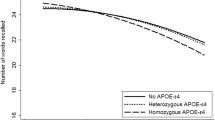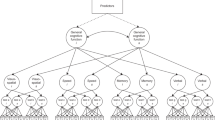Abstract
APOE e4-related memory deficits were reported in a normal population aged between 50 and 60 when controlling for general cognitive ability in early adulthood. This extended findings of APOE e4 effects on cognitive ability in 60–80-year-olds to a younger group and confirmed that this effect relates to changes in memory ability with age. The present study tests the association of APOE e4 variation with verbal and spatial memory in a sample of 70-year-olds both adjusted and non-adjusted for childhood and adult general cognitive ability. The 1,013 participants comprise surviving members of the 1947 Scottish Mental Survey resident in the Lothian area of Scotland. They were tested on general cognitive ability at age 11 years and followed up at about age 70 with tests of verbal (immediate and delayed) and spatial memory. General linear models were used to test the association between variation in the APOE polymorphism (e4 presence vs. absence) and memory measures. Of the eight measures tested, Spatial span forward was significantly associated with APOE e4 variation (P = 0.04) when adjusting for IQ, whereas Logical memory immediate was associated with APOE e4 variation (P = 0.04) in the analysis not controlling for IQ. Neither of these tests was significant when a correction for multiple testing was applied. APOE e4 does not influence memory abilities in a normal population of 70-year-olds.
Similar content being viewed by others
References
Bondi MW, Salmon DP, Galasko D, Thomas RG, Thal LJ (1999) Neuropsychological function and apolipoprotein E genotype in the preclinical detection of Alzheimer’s disease. Psychol Aging 14:295–303. doi:10.1037/0882-7974.14.2.295
Bretsky P, Guralnik JM, Launer L, Albert M, Seeman TE (2003) The role of APOE-epsilon4 in longitudinal cognitive decline: MacArthur studies of successful aging. Neurology 60:1077–1081
Caselli RJ, Graff-Radford NR, Reiman EM, Weaver A, Osborne D, Lucas J, Uecker A, Thibodeau SN (1999) Preclinical memory decline in cognitively normal apolipoprotein E-epsilon4 homozygotes. Neurology 53:201–207
Cohen RM, Small C, Lalonde F, Friz J, Sunderland T (2001) Effect of apolipoprotein E genotype on hippocampal volume loss in aging healthy women. Neurology 57:2223–2228
Corder EH, Saunders AM, Strittmatter WJ, Schmechel DE, Gaskell PC, Small GW, Roses AD, Haines JL, Pericak-Vance MA (1993) Gene dose of apolipoprotein E type 4 allele and the risk of Alzheimer’s disease in late onset families. Science 261:921–923. doi:10.1126/science.8346443
Deary IJ, Whalley WJ, Clair D, Breen G, Leaper S, Lemmon H, Hayward C, Starr JM (2003) The influence of the e4 allele of the apolipoprotein E gene on childhood IQ, nonverbal reasoning in old age, and lifetime cognitive change. Intelligence 31:85–92. doi:10.1016/S0160-2896(02)00114-9
Deary IJ, Whiteman MC, Pattie A, Starr JM, Hayward C, Wright AF, Visscher PM, Tynan MC, Whalley LJ (2004a) Apolipoprotein e gene variability and cognitive functions at age 79: a follow-up of the Scottish mental survey of 1932. Psychol Aging 19:367–371. doi:10.1037/0882-7974.19.2.367
Deary IJ, Whiteman MC, Starr JM, Whalley LJ, Fox HC (2004b) The impact of childhood intelligence on later life: following up the Scottish mental surveys of 1932 and 1947. J Pers Soc Psychol 86:130–147. doi:10.1037/0022-3514.86.1.130
Deary IJ, Spinath FM, Bates TC (2006) Genetics of intelligence. Eur J Hum Genet 14:690–700. doi:10.1038/sj.ejhg.5201588
Deary IJ, Gow AJ, Taylor MD, Corley J, Brett C, Wilson V, Campbell H, Whalley LJ, Visscher PM, Porteous DJ, Starr JM (2007) The Lothian Birth Cohort 1936: a study to examine influences on cognitive ageing from age 11 to age 70 and beyond. BMC Geriatr 7:28. doi:10.1186/1471-2318-7-28
Farrer LA, Cupples LA, Haines JL, Hyman B, Kukull WA, Mayeux R, Myers RH, Pericak-Vance MA, Risch N, van Duijn CM (1997) Effects of age, sex, and ethnicity on the association between apolipoprotein E genotype and Alzheimer disease. A meta-analysis. APOE and Alzheimer disease meta analysis consortium. J Am Med Assoc 278:1349–1356. doi:10.1001/jama.278.16.1349
Flory JD, Manuck SB, Ferrell RE, Ryan CM, Muldoon MF (2000) Memory performance and the apolipoprotein E polymorphism in a community sample of middle-aged adults. Am J Med Genet 96:707–711. doi:10.1002/1096-8628(20001204)96:6<707::AID-AJMG1>3.0.CO;2-V
Folstein MF, Folstein SE, McHugh PR (1975) “Mini-mental state. A practical method for grading the cognitive state of patients for the clinician. J Psychiatr Res 12:189–198. doi:10.1016/0022-3956(75)90026-6
Halpern DF (1992) Sex differences in cognitive abilities. Erlbaum, Hillsdale
Hubacek JA, Pitha J, Skodova Z, Adamkova V, Lanska V, Poledne R (2001) A possible role of apolipoprotein E polymorphism in predisposition to higher education. Neuropsychobiology 43:200–203. doi:10.1159/000054890
Jorm AF, Mather KA, Butterworth P, Anstey KJ, Christensen H, Easteal S (2007) APOE genotype and cognitive functioning in a large age-stratified population sample. Neuropsychology 21:1–8. doi:10.1037/0894-4105.21.1.1
Kangas J, Bradway K (1971) Intelligence at middle age: a thirty-eight-year follow-up. Dev Psychol 5:333–337. doi:10.1037/h0031471
Lewin C, Wolgers G, Herlitz A (2001) Sex differences favoring women in verbal but not in visuospatial episodic memory. Neuropsychology 15:165–173. doi:10.1037/0894-4105.15.2.165
Maxell J (1961) The level and trend of national intelligence: the contribution of the Scottish Mental Surveys. University of London Press, London
Mayeux R, Small SA, Tang M, Tycko B, Stern Y (2001) Memory performance in healthy elderly without Alzheimer’s disease: effects of time and apolipoprotein-E. Neurobiol Aging 22:683–689. doi:10.1016/S0197-4580(01)00223-8
McCall RB (1979) The development of intelligence functioning in infancy and the prediction of later IQ. In: Osofsky J (ed) Handbook of infant development. Wiley, New York
Meinz EJ, Salthouse TA (1998) Is age kinder to females than to males? Psychon Bull Rev 5:56–70
Nilsson LG, Adolfsson R, Backman L, Cruts M, Nyberg L, Small BJ, Van Broeckoven C (2006) The influence of APOE status on episodic and semantic memory: data from a population-based study. Neuropsychology 20:645–657. doi:10.1037/0894-4105.20.6.645
Office of Population Censuses and Surveys (1980) Classification of occupations and coding index. HMSO, London
Packard CJ, Westendorp RG, Stott DJ, Caslake MJ, Murray HM, Shepherd J, Blauw GJ, Murphy MB, Bollen EL, Buckley BM, Cobbe SM, Ford I, Gaw A, Hyland M, Jukema JW, Kamper AM, Macfarlane PW, Jolles J, Perry IJ, Sweeney BJ, Twomey C (2007) Association between apolipoprotein E4 and cognitive decline in elderly adults. J Am Geriatr Soc 55:1777–1785. doi:10.1111/j.1532-5415.2007.01415.x
Purcell S, Cherny SS, Sham PC (2003) Genetic power calculator: design of linkage and association genetic mapping studies of complex traits. Bioinformatics 19:149–150. doi:10.1093/bioinformatics/19.1.149
Salthouse TA (1998) Independence of age-related influences on cognitive abilities across the life span. Dev Psychol 34:851–864. doi:10.1037/0012-1649.34.5.851
Schultz M, Lyons M, Franz C, Grant M, Boake C, Jacobson K, Xian H, Schellenberg G, Eisen S, Kremen W (2008) Apolipoprotein E genotype and memory in the sixth decade of life. Neurology 70:1771–1777
Scottish Council for Research in Education. (1949) The trend of Scottish intelligence: a comparison of the 1947 and 1932 surveys of the intelligence of eleven-year-old pupils. University of London Press, London
Small BJ, Graves AB, McEvoy CL, Crawford FC, Mullan M, Mortimer JA (2000) Is APOE–epsilon4 a risk factor for cognitive impairment in normal aging? Neurology 54:2082–2088
Small BJ, Rosnick CB, Fratiglioni L, Backman L (2004) Apolipoprotein E and cognitive performance: a meta-analysis. Psychol Aging 19:592–600. doi:10.1037/0882-7974.19.4.592
Smith GE, Bohac DL, Waring SC, Kokmen E, Tangalos EG, Ivnik RJ, Petersen RC (1998) Apolipoprotein E genotype influences cognitive ‘phenotype’ in patients with Alzheimer’s disease but not in healthy control subjects. Neurology 50:355–362
SPSS (2005) SPSS 14.0 for Windows. SPSS, Chicago
Turic D, Fisher PJ, Plomin R, Owen MJ (2001) No association between apolipoprotein E polymorphisms and general cognitive ability in children. Neurosci Lett 299:97–100. doi:10.1016/S0304-3940(00)01789-4
Wechsler D (1998) WMS-IIIUK administration and scoring manual. Psychological Corporation, London
Welsh-Bohmer KA, Ostbye T, Sanders L, Pieper CF, Hayden KM, Tschanz JT, Norton MCFTCCSG (2008) Neuropsychological performance in advanced age: influences of demographic factors and Apolipoprotein E: findings from the Cache County memory study. Clin Neuropsychol 1–23. June 10 [Epub ahead of print]. doi:10.1080/13854040801894730
Wenham PR, Price WH, Blandell G (1991) Apolipoprotein E genotyping by one-stage PCR. Lancet 337:1158–1159. doi:10.1016/0140-6736(91)92823-K
Wigginton JE, Abecasis GR (2005) PEDSTATS: descriptive statistics, graphics and quality assessment for gene mapping data. Bioinformatics 21:3445–3447
Wilson RS, Schneider JA, Barnes LL, Beckett LA, Aggarwal NT, Cochran EJ, Berry-Kravis E, Bach J, Fox JH, Evans DA, Bennett DA (2002) The apolipoprotein E epsilon 4 allele and decline in different cognitive systems during a 6-year period. Arch Neurol 59:1154–1160. doi:10.1001/archneur.59.7.1154
Yip AG, Brayne C, Easton D, Rubinsztein DC (2002) Apolipoprotein E4 is only a weak predictor of dementia and cognitive decline in the general population. J Med Genet 39:639–643. doi:10.1136/jmg.39.9.639
Yu WY, Lin CH, Chen SP, Hong CJ, Tsai SJ (2000) Intelligence and event-related potentials for young female human volunteer apolipoprotein E e4 and non-e4 carriers. Neurosci Lett 294:179–181. doi:10.1016/S0304-3940(00)01569-X
Zelinski EM, Stewart ST (1998) Individual differences in 16-year memory changes. Psycholm Aging 13:622–630. doi:10.1037/0882-7974.13.4.622
Acknowledgments
We thank the LBC1936 cohort members. We thank the study Secretary Paula Davies. We thank Janie Corley, Caroline Brett and Caroline Cameron for data collection and data entry. We thank the nurses and other staff at the Wellcome Trust Clinical Research Facility where the data were collected. We thank the staff at Lothian Health Board, and the staff at the SCRE Centre, University of Glasgow. The UK Medical Research Council and the University of Edinburgh provide core funding for the Centre for Cognitive Ageing and Cognitive Epidemiology which supported this research. The research was supported by a programme grant from Research Into Ageing. The research continues with programme grants from Help the Aged/Research Into Ageing (Disconnected Mind) and the Medical Research Council. IJD is the recipient of a Royal Society-Wolfson Research Merit Award. PMV is supported by the Australian National Health and Medical Research Council.
Author information
Authors and Affiliations
Corresponding author
Additional information
Edited by Chandra Reynolds.
Rights and permissions
About this article
Cite this article
Luciano, M., Gow, A.J., Taylor, M.D. et al. Apolipoprotein E is not Related to Memory Abilities at 70 Years of Age. Behav Genet 39, 6–14 (2009). https://doi.org/10.1007/s10519-008-9236-x
Received:
Accepted:
Published:
Issue Date:
DOI: https://doi.org/10.1007/s10519-008-9236-x




